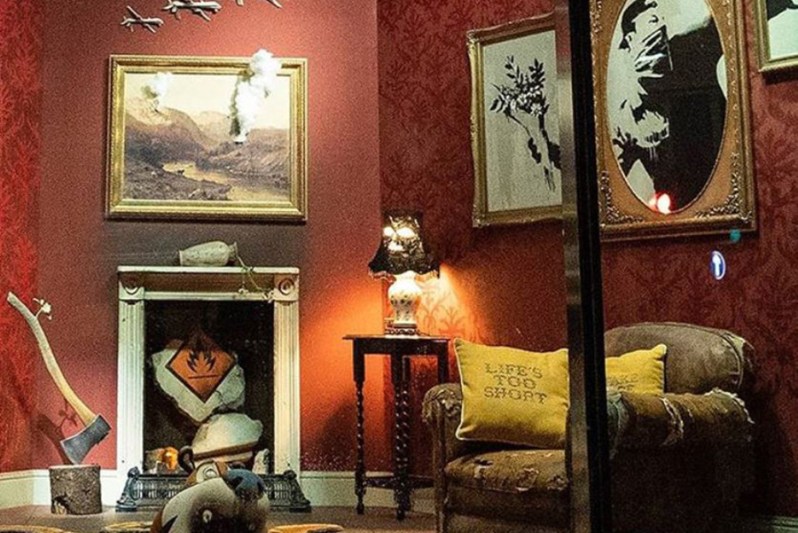
Home goods stores aren’t known for making bold socio-political statements. London’s new Gross Domestic Product, though, is no ordinary housewares outlet. The Banksy-owned pop-up shop is an “anti-Pottery Barn” of sorts, where everything from the rugs to the dishes to the wall art proudly thumbs its nose at capitalism, political leaders, and even customers.
Earlier this month, Gross Domestic Product popped up without warning in the town of Croydon in south London with the tagline “Where art irritates life.” Initial details were thin, with only a vague printed sheet of paper indicating its origins. Unlike traditional home goods stores, the storefront is the store. Customers can only window shop. Actual orders must be placed through the store’s official website.
Each of the store’s windows depicts a unique theme. The centerpiece is a decaying reading lounge adorned with a shredded leather chair and a fireplace surrounded by stenciled jacquard wallpaper. The dystopian decor (if you can call it that) includes a mutilated Tony the Tiger animal skin rug, an ornate triptych depicting a masked rioter tossing a flower bouquet, and a doll set inspired by the worldwide refugee crisis. Other wares highlight Banksy’s dark and brazen sense of humor. Stitched throw pillows proclaim that “Life’s too short to take advice from a cushion.” In another display hangs a disco ball repurposed from a disused police helmet and a welcome mat stitched from life jackets used by refugees in a Greek detainment camp. Elsewhere, a headstone reads, “You have now reached your destination.”
The store’s opening appears born of necessity. Evidently, British law dictates that if a brand is not using its trademark to make or sell merchandise, someone else can. That printed one-sheet message taped outside the storefront claims, “This shop has come about as a result of legal action. A greeting cards company is trying to sieze [sic] legal custody of the name Banksy from the artist, who has been advised the best way to prevent this is to sell his own range of branded merchandise.”
As proof that this isn’t a thinly veiled money grab, the artist still actively hopes fans will acquire or adapt his work however they like. “I still encourage anyone to copy, borrow, steal, and amend my art for amusement, academic research, or activism. I just don’t want them to get sole custody of my name.”
Prices reportedly start at £10 for a partially used spray paint can. Although, for an artist whose shredded works fetch north of $1.4 million, the chance of scoring anything from his “store” seems incredibly slim. Considering that Gross Domestic Product has yet to begin accepting orders, however, it could be that the store itself is nothing more than a clever, Banksy-branded social statement.


